3rd Steering Group Meeting & 2nd Interregional Thematic 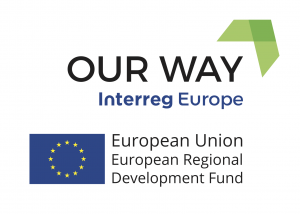 Workshop of the OurWay Project.
Workshop of the OurWay Project.
- Original and successful local development initiatives in the beautiful Bieszczady Mountains in Podkarpackie.
- Funding opportunities for tourism and greenways, linked to the promotion and management of cultural and natural heritage.
- Development of greenways as the perfect way to promote the natural and cultural resources of the region.
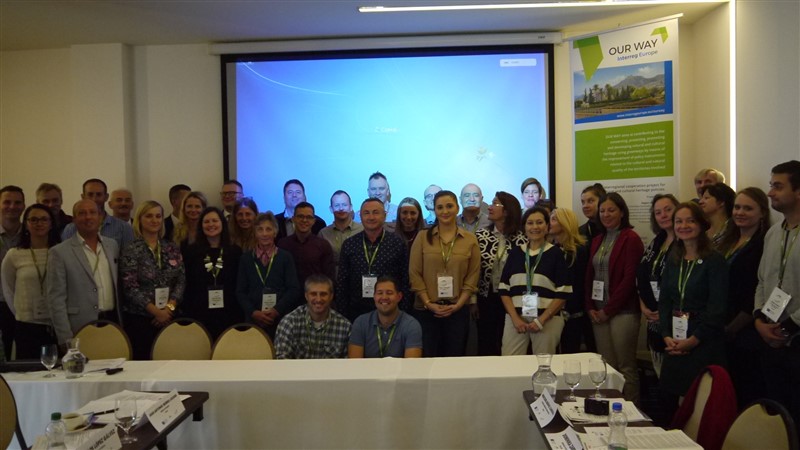
The 2nd Interregional Thematic Workshop “Identification of financial instruments and funding for Greenways” was held in Rzeszów, Poland, on 24 – 25 September 2019, together with the 3rd Steering Group Meeting of the OurWay project.The first day saw a visit to the Bieszczady Mountains to get to know different entrepreneurial and local development initiatives on the ground. The local panorama was completed with presentations by stakeholders and other interest groups for attendees to learn about greenways in Poland and other experiences and initiatives underway in the territory. The 3rd Steering Group Meeting was also held at the same location.The second day was set aside for the thematic workshop, which focused on the identification of financial instruments for greenways, with presentations from partners and stakeholders in the Podkarpackie region. There was also an opportunity for the project partners to exchange ideas and discuss financing, opportunities and limitations to greenways development and other issues of interest.
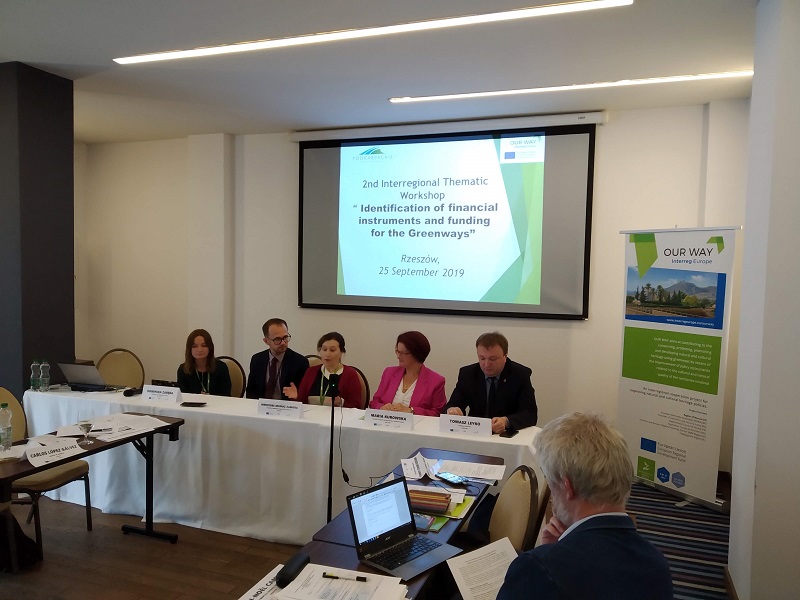 Thanks to the press conference, attended by the Vice Marshal of the region, we were able to spread the word about the OurWay project and the benefits of greenways for the territories they pass through, as well as draw attention to the potential for development in Podkarpackie. The Vice Marshal also announced the region’s unequivocal commitment to moving forward a strategy for the development of greenways as the perfect way to promote the natural and cultural resources of the region.The director of the EGWA had previously had a meeting with Władysław Ortyl, Marshal of Podkarpackie, and department chiefs, during which the region’s highest representative expressed his explicit commitment to support the implementation of a greenway strategy for Podkarpackie.
Thanks to the press conference, attended by the Vice Marshal of the region, we were able to spread the word about the OurWay project and the benefits of greenways for the territories they pass through, as well as draw attention to the potential for development in Podkarpackie. The Vice Marshal also announced the region’s unequivocal commitment to moving forward a strategy for the development of greenways as the perfect way to promote the natural and cultural resources of the region.The director of the EGWA had previously had a meeting with Władysław Ortyl, Marshal of Podkarpackie, and department chiefs, during which the region’s highest representative expressed his explicit commitment to support the implementation of a greenway strategy for Podkarpackie.
>>>Conclusions
We were given a fantastic welcome in Podkarpackie and got to know some beautiful places in Bieszczady and Rzeszów as well as the nature and heritage of the region.In particular, we all had the opportunity to meet local people full of creativity, drive and commitment to launch initiatives of great importance for the development of Bieszczady and Podkarpackie, which have made a big impact on the territory and will inspire new initiatives.The presentations and visits demonstrated that good funding opportunities are available for European projects, for tourism and greenways, linked to the promotion and management of cultural and natural heritage, successful examples of which have been exhibited. They can be directly managed through Interreg projects, for example, which include infrastructure funding as well as implementation by national authorities.But to do so, it is essential to remember that actions relating to tourism (and greenways) must be included in Regional Strategies and Operational Programmes in order to be subsequently financed by European funds. Proposed initiatives will receive no funding if they cannot meet this criterion. The project partners cited a number of limitations of this kind in relation to the development of cyclable infrastructure in the current 2014 – 2020 period.It is also very important to obtain guaranteed income for the operation, maintenance and development of greenways. An excellent example is the French land planning tax in France mentioned by Hérault, the construction tax which enables the funding of route itinerary planning and promotion in environmentally sensitive areas.
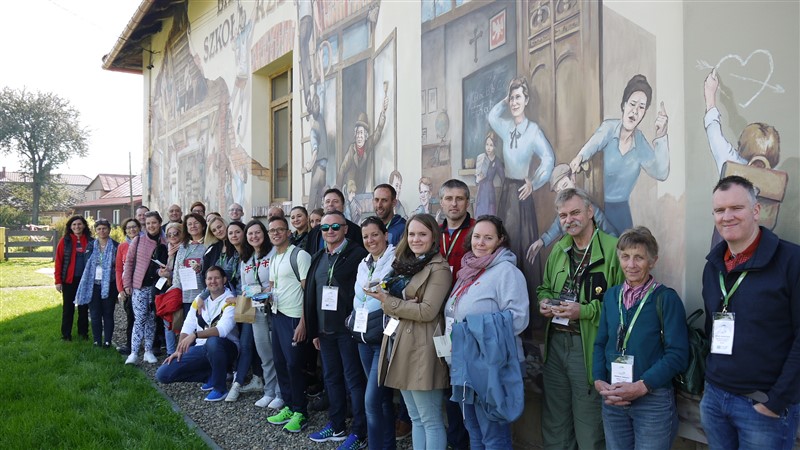
An environment that includes people with creativity and drive, backed by stakeholder collaboration, has favoured the introduction of high-impact initiatives in the Bieszczady Mountains to the southeast of Podkarpackie in Poland. Beginning with the Bieszczady Bicycle Draisines (Uherce Mineralne), which has given a new use to the disused railway and achieved impressive numbers of visitors, the trend was recently continued with the Bieszczady School of Craft in the same locality, which is also showing all the signs of becoming a success, like the craft brewery Ursa Maior, and the Milling Museum and Restaurant in Ustrzyki Dolne. It should also be noted how links with local artists and craftsmen have contributed to the success of local development initiatives in Bieszczady.
The social economy is another formula for revitalising local economies and encouraging private initiatives, as shown in the example of the Czatownia Café in Czarna Górna, linked to the Eastern Carpathians Green Velo route.
Another initiative presented focuses on collaboration with the private sector, relying on the CSR policies of companies in the territory: greenways meet all the criteria to be incorporated into company CSR strategies and receive funding, as shown in the example of the greenways in Murcia.
In all cases, funding is closely linked to cooperation, since the participation of both public and private stakeholders is essential for joint projects. Round tables or meetings under the name or guise that best adapts to the possibilities of the territories are essential to working in collaboration.
It is therefore essential to have human resources with the training, the motivation and the necessary personal skills to carry out these concertation tasks. The representatives from the French department of Hérault described an example of concertation in which the plans mentioned above were developed in collaboration with other provincial departments—e.g. tourism—and with many and varied non-profit associations. Concertation is an essential task that requires interest and dedication. In the example of Hérault, one person worked specifically on enabling these cooperative agreements with stakeholders.
Public, private and non-profit sector promotion is key to making a itinerary or a territory known and achieving a positive economic impact through tourism, and this will be the subject of the next seminar in Montpellier (France).
On the whole, the meeting was highly positive and comprehensive and facilitated a first direct contact with this beautiful region as well as discussion of greenways funding issues, which was the objective of the seminar.
We were also able to learn first-hand the region’s commitment, reiterated by its governors, to the OurWay project.The leaders of the Podkarpackie project have involved their stakeholders on site and mobilised key authorities from neighbouring regions, such as Świętokrzyskie, to disseminate the project and communicate the importance of greenways for the promotion of the territory’s cultural and natural resources.
>>> Meeting with Marshal Władysław Ortyl
The director of the EGWA had the opportunity to meet with Marshal Władysław Ortyl and the Marshal office management team, as well as a chat with Deputy Marshal Maria Kurowska.
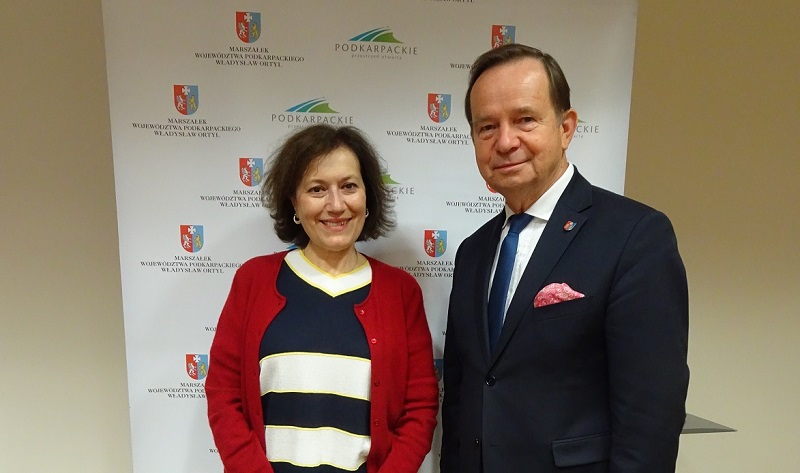
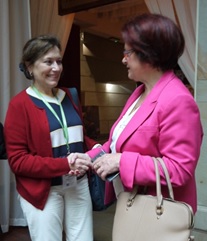
It was an excellent opportunity to convey to regional authorities the potential of greenways for local and regional development, which is triggering their increasing spread throughout Europe. The Marshal and the Vice Marshal expressed their explicit commitment to the realisation of a greenway plan for Podkarpackie.
Mercedes Muñoz
European Greenways Association, Director
Advisory Partner
Credit photos: © Murcia Region; Podkarpackie region, EGWA






